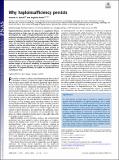Why haploinsufficiency persists
Author(s)
Morrill, Summer A.; Amon, Angelika B
DownloadPublished version (10.27Mb)
Terms of use
Metadata
Show full item recordAbstract
Haploinsufficiency describes the decrease in organismal fitness observed when a single copy of a gene is deleted in diploids. We investigated the origin of haploinsufficiency by creating a comprehensive dosage sensitivity data set for genes under their native promoters. We demonstrate that the expression of haploinsufficient genes is limited by the toxicity of their overexpression. We further show that the fitness penalty associated with excess gene copy number is not the only determinant of haploinsufficiency. Haploinsufficient genes represent a unique subset of genes sensitive to copy number increases, as they are also limiting for important cellular processes when present in one copy instead of two. The selective pressure to decrease gene expression due to the toxicity of overexpression, combined with the pressure to increase expression due to their fitness-limiting nature, has made haploinsufficient genes extremely sensitive to changes in gene expression. As a consequence, haploinsufficient genes are dosage stabilized, showing much more narrow ranges in cell-to-cell variability of expression compared with other genes in the genome. We propose a dosage-stabilizing hypothesis of haploinsufficiency to explain its persistence over evolutionary time.
Date issued
2019-05Department
Massachusetts Institute of Technology. Department of Biology; Paul F. Glenn Center for Biology of Aging Research (Massachusetts Institute of Technology); Koch Institute for Integrative Cancer Research at MITJournal
Proceedings of the National Academy of Sciences
Publisher
National Academy of Sciences
Citation
Morrill, Summer A. and Angelika Amon. "Why haploinsufficiency persists." Proceedings of the National Academy of Sciences 116, 24 (May 2019): 11866-11871 © 2019 National Academy of Sciences
Version: Final published version
ISSN
0027-8424
1091-6490